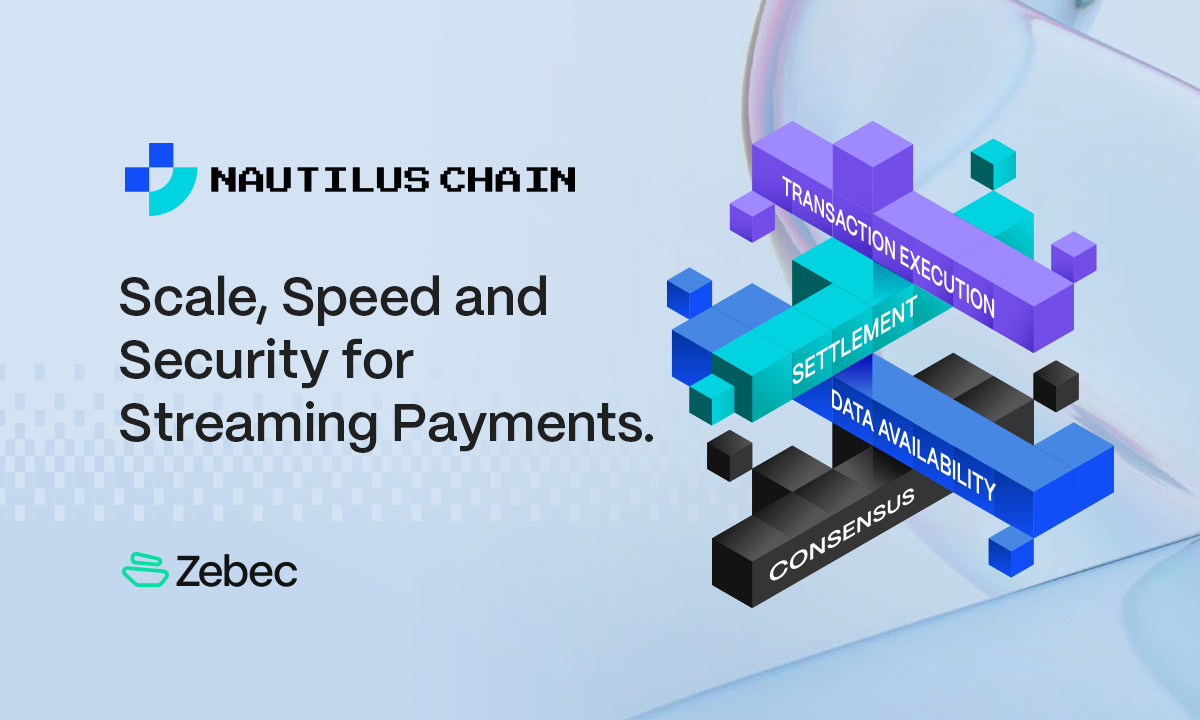New York, USA, August 21st, 2023, Chainwire
Zebec has launched Nautilus, a modular L3 network that supports its blockchain-based global payment infrastructure. Nautilus enables continuous payment streaming and real-time payroll services on a previously impossible scale.
As a first-of-its-kind L3, Nautilus enables more than just instant payments. It can also facilitate Zebec Protocol’s live-payment streaming service at scale, made possible by the fastest EVM environment in web3.
Capable of parallel transaction processing, Nautilus is built for scalability, interoperability, and security through interchangeable modules for consensus, settlement, data availability, and transaction execution. This modularity will have a significant impact on how web3 payment infrastructure is composed and adopted.
“Zebec is helping to create a future where money moves more freely, providing individuals, businesses, investors, and teams with quicker and easier access to funds and tokens,” said Zebec Founder Sam Thapaliya. “Launching the Nautilus Chain, and the new suite of products built on it, is a significant step towards our vision.”
With Nautilus now live, Zebec’s team is set to bring single-side staking and DeFi yields online in select jurisdictions and power ZebecPay – its live streaming web3 payroll services. Zebec is also in the process of launching a traditional payroll app, WageLink, with a planned integration with Circle. With the Nautilus chain functionality, Zebec is able to offer crypto off-ramps directly linked to US bank accounts (via a partnership with CoinFlow) and roll out Zebec Card programs in Asia and Europe. These products and services will augment Zebec’s existing services.
Zebec started as a continuous settlement protocol that enabled real-time payments, or payment streaming, allowing businesses to pay employees and partners in real-time in a tax-compliant way. However, the limitations of existing blockchain technology soon became apparent. Networks were either too slow or too unreliable to keep up with demand. To solve the issue, Zebec Labs created a next-generation blockchain: fast enough to facilitate payment streaming at scale, which could, critically, integrate with Ethereum-based chains.
Originally planned for Zebec’s core DeFi projects for internal payments and value/assets transfer, Nautilus testnet became one of the most prominent testnets in the crypto world. Having facilitated over 50 million transactions, with 400,000 wallets and 3,000 smart contracts deployed in its first 8 months, Nautilus chain has proven its utility and functionality beyond DeFi and opened to projects from other sectors, such as NFTs, Gamefi, etc., thus becoming a “general purpose” L3.
A huge upside to Nautilus’ modular system is that it gives developers the flexibility to configure the “chain stack” they use to build their dApps. A modular chain uses interchangeable modules for consensus, data availability, settlement, and execution. Each of these layers can be configured to developer needs or optimized based on the dApp being serviced. Especially at the execution layer, customized rollups can be deployed that optimize for privacy or scalability, or decentralization — whatever is required by the dApp.
Modular chains allow for infinite horizontal scaling and greater levels of interoperability. Since developers build from the same pool of modules, code is safer, more battle-tested, and easier to connect. More rollups and parallel chains can be deployed to increase block space and throughput effectively. Nautilus is a pioneer in this new type of blockchain, and its architecture will permanently change how blockchains are built and bring them into the real world.
At launch, Nautilus’ settlement layer is built using Solana’s VM, MOVE, and its execution layer on Neon EVM using Solidity smart contracts. Data availability is stored off-chain using Celestia. Nautilus’ initial default execution layer will use optimistic rollups, but the team plans to transition to zkRollups for faster settlements, privacy, and even higher levels of scalability.
Nautilus is built with Celestia and Eclipse empowering modular chains. Through Celesita, Nautilus allows projects to tailor their consensus and settlement layers. Eclipse allows builders on Nautilus to deploy customized rollups on their execution layer.
The result is a chain with Soloana-like speeds but with the security and decentralization of Ethereum. According to its engineers, Nautilus has been tested up to 3,000 TPS, but the team expects the number to increase with the transition to zkRollups. By having such a high TPS, Nautilus chain provides a platform that can keep up with the demands of the real world, opening the door to decentralized markets for financial instruments and assets, such as stocks, bonds, real estate, and tokenized real-world assets.
Thanks to Nautilus, Zebec can now operate on a much larger scale. Businesses can pay employees and partners in real time through live payments or payment streaming. Zebec’s goal isn’t merely to provide more efficient payment services; it’s to onboard millions of new users through user-friendly, secure payment apps and new use cases.
Zebec’s innovation paves the way for pay-as-you-go payment plans for streaming services, car-sharing platforms, gyms, residential clubs, and more. It enables potential new business models and applications not yet created. As Zebec continues to innovate and grow its ecosystem, it invites developers and founders from around the world to join it in creating a more connected, efficient, and accessible financial future.
About Zebec
Zebec enables real-time and continuous streams of payments and financial transactions for payroll, investments, and more. It was founded in 2021, with investments from Circle, Coinbase, Solana Ventures, Breyer Capital, Republic, and Lightspeed Venture Partners, among others. Zebec already services hundreds of companies, running thousands of continuous payment streams and bringing the blockchain to our day-to-day lives.
Website | Twitter | Discord | Telegram
About Nautilus
Nautilus is a high-performance real-world payment modular chain. Using celestia and eigenlayer, It delivers high-speed and low-cost transaction processing with a secure and stable decentralized foundation.
Website | Twitter | Telegram | Medium
Contact
Elena Solovyov
Zebec
[email protected]
Credit: Source link















































